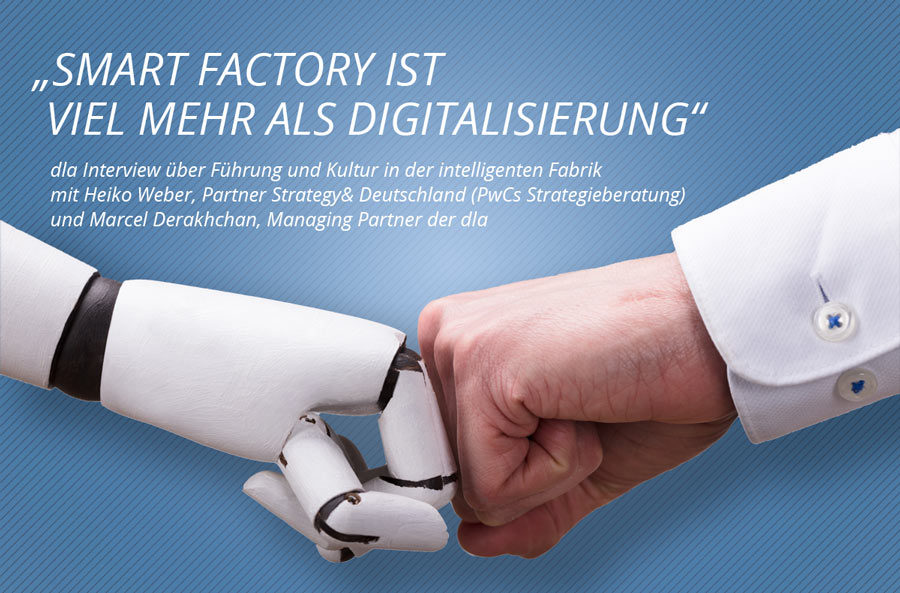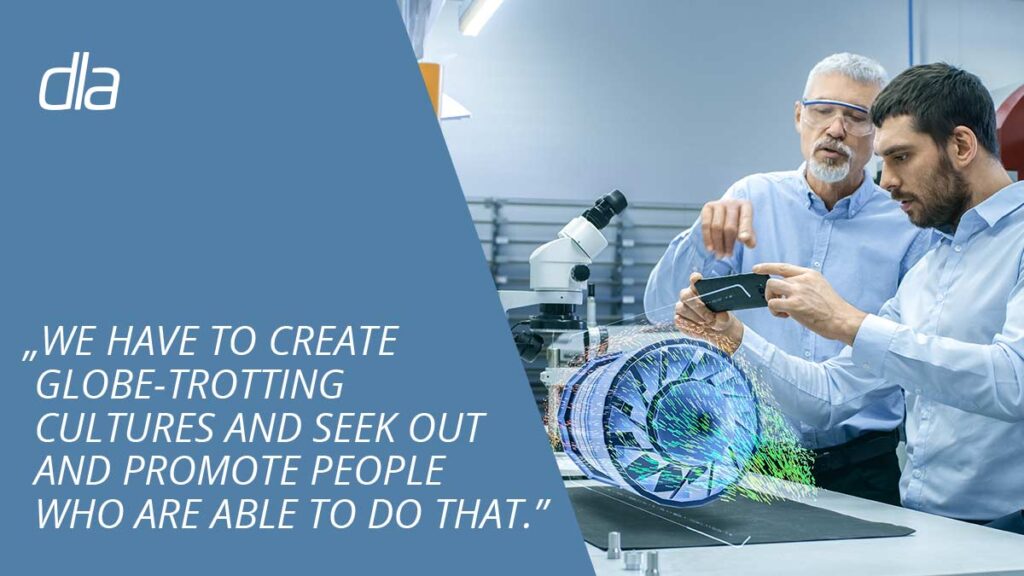
Mr. Weber, Mr. Derakhchan, the smart factory is essentially more open and also more externally networked than a conventional factory. What does this mean for conventional management instruments? Do you need an update?
Heiko Weber: Absolutely. The structures are going to change, they’re becoming more agile. Conventional hierarchical pyramids are going to die out in the long run. As a result, we’ll need to allocate resources and qualifications more flexibly. The way people work is going to change – for example, we’ll be working in “squads” for the individual links of the value creation chain.
Marcel Derakhchan: I think that we need to start early – not with the tools and not with concrete skills. But rather by asking how we’ll need to adapt our perceptions of the roles we play as managers and the opportunities we have under these new circumstances. This is a question of personal philosophy, as well as managing style. I predict that we’re going to see a really profound transformation.
In an extreme case, would the smart factory dissolve completely in the supply chain?
HW: It’s an extreme case scenario, but in some areas, I do think we’ll see that happen. In cases like that, the lines are blurred between the supplier and the OEM. These kinds of systems cannot be controlled with conventional management methods.
One of the main management-related issues at the factory is shop floor management, which not only means operative management and coordination but also serves to foster community. Is there still a place for this concept at the smart factory?
HW: Shop floor management will still exist in the future, but the tools and focus are going to change. Naturally, the classic control loop (identifying deviations, determining and implementing measures and reviewing their efficacy) will have to be managed differently in future. The issues are becoming more complex, the systems to be managed are becoming more extensive, and interventions increasingly have to be done in real time. The logical consequence is that, in future, artificial intelligence will be used to handle digital shop floor management and assume these control mechanisms. But since smart factories are still going to have people working in them, community building will have to be done using different methods and from a different perspective.
MD: Exactly. In the next few years, we’re going to be going through a stage of transformation. It’s going to be more challenging for managers than normal operation. Until now, operative management has been primarily about the “how” aspect of work. About optimisation, boosting efficiency… Community building is something that happens unconsciously along the way, as a side-effect. During periods of change, everything is different. Then it becomes more about explaining the “why” at every level of management. This has a lot to do with finding meaning. But it also has to do with the thematisation of parameters that are not otherwise examined, with actively tackling fears and concerns, with conscious community management. What’s interesting is that we’re also still going to be using the old management concepts – the tasks and roles of managers are going to become more challenging, and their psychological and emotional endurance will be put to a new kind of test. Finding people to match this much more demanding job profile is not going to be easy.

Thanks to advances in robotics and AI, we’re soon going to be seeing mixed teams – people and robots working together. Does this development have any implications for culture and leadership?
HW: Do you know the film “Short Circuit”? Well, the emotional connection between man and machine is not going to go quite that far. But naturally, we’re going to see our co-bots as more than just a better screwdriver. People have a tendency towards anthropomorphism. So the close collaboration between man and machine is also reflected in management. The first step is a culture of openness that supports growth in this direction, so that employees accept the new working arrangement.
What do managers have to be able to do?
MD: They need new skills and extensive knowledge of digitalisation. The introduction of new technologies always requires “reverse mentoring”: Managers can and should have new, young employees explain new technologies to them. This is definitely a transformation, and it’s going to demand more from today’s leaders.
HW: With regard to culture, there’s also the issue of who will be responsible for the operation of the co-robots. In today’s silos, it’s simple: If the machine isn’t working, the worker first calls a standby technician and then the production engineer. The production engineer then puts Maintenance or Planning in charge of the problem. If we’re really thinking “collaboration”, then workers will be responsible for their electronic co-workers. This is a serious change.
The smart factory has a high degree of transparency with regard to every movement operation. Does this mean that, in extreme cases, management can operate entirely algorithmically?
HW: The smart factory can be a highly automated factory producing large batches of very similar products. Here, it will indeed be possible to control the actual production process through AI in future. But there will still be human teams that need managing – service technicians, engineers and many others. And the smart factory can also be a flexible factory. With the help of digitalisation, it can be capable of managing extreme complexities and individualisation. These production processes are also heavily supported and regulated by AI, but there will be a much higher proportion of people in this system.
MD: Either way, there will still be people at the factory. And people require management, which is about more than just algorithms and mathematical optimisation, and that’s not going to change. You can outsource work organisation to algorithms. But not management.

If data analyses, intelligent assistants, AR tools and smart exoskeletons become standard… Will intuition and experience have any relevance at all anymore?
HW: Human experience will always be a differentiating factor, just not in every area. In the future, we won’t need experience anymore to, let’s say, identify the cause of an error in motor assembly after a failed cold test. That’s going to happen automatically by means of machine learning. Instead, we’ll need experience to understand the functionalities and limitations of algorithms and to know when we need to intervene. To manage digital and semi-automated production systems, we need more and more digital and algorithmic experience and comprehension.
It’s no longer surprising that the ability to expertly handle data is now becoming one of the primary skills required in management. But is that really all that it takes to managing a smart factory?
HW: No, naturally not. The smart factory is more than digitalisation. We’re also talking about increasingly internationally interconnected global networks. And that’s why cultural understanding will be playing an even bigger role than it does today. Add to that the need to work with considerably more partners or at least to work in completely new constellations. With cloud service providers, platform operators, software suppliers and many more. The ability to balance various interests and cultures is becoming more important. More intensive involvement of clients in earlier stages of the development and production process also requires new capabilities and social skills.
MD: For decades already, we’ve been discussing the concept of a “company without borders” – integrated supply chains, collaboration. Only, if you ask decision-makers where the most frequent problems, needs and inefficiencies are, they’ll all tell you the same thing – it’s in the interfaces between departments, companies and cultural environments. Managing relationships that extend outside your own cluster is and always has been challenging. It’s a problem that’s inherent to human beings in general. But it’s also a matter of education and professional socialisation.
The critical issue now is that we can’t afford to have these problems anymore if the smart factory actually becomes a reality. We have to create globe-trotting cultures and seek out and promote people who are able to do that. In a few years, we’ll probably have systems capable of flawless simultaneous translation. But they can’t replace people who enable “cultural communication”.

Are teams even prepared for this close customer collaboration with regard to processes and culture?
HW: Definitely not prepared enough. If we look at the automotive industry, in a lot of areas, we still find the old world. That’s where we develop what’s technologically possible and what the average customer might like to purchase. The actual benefit to the customer does not take centre stage, even though that precisely what’s changing right now. Today, this benefit to the customer is not “a car” – it’s something like “I want to get from point A to point B. I want to do it right now and comfortably”. When it comes to getting close to the customer, understanding their actual needs, responding to them quickly or even bringing the customer over to new ecosystems, the automotive industry still has a long way to go. The transformation may be underway at the level of service offerings and marketing programmes. But it’s still a long way off from permeating companies’ entire organisational and process networks.
MD: We can see that companies are increasingly beginning to acknowledge this gap. But this isn’t like implementing a new production routine. It’s a complex social transformation process that has to be regulated and moderated very intensively.
In what areas of the smart factory are we seeing the most dramatic labour shortages? Are these shortages already being felt today?
HW: The list is already long. We need Data Analysts, Industrial Data Scientists, Robotics and Industrial Automation Experts, Software Engineers, Smart-Machine Maintenance Engineers… This is a hallmark of the digital transformation – the need for staff always develops much faster than our conventional education and training systems can catch up. This not only leads to shortages but also to fears and new fault lines across entire organisations and companies.
MD: And we can’t solve it by merely making appeals. Under these circumstances, management also means having awareness of this problem and making sure that the bond that currently holds organisations together is not broken. This is a colossal task.

Data specialists as number 1 hiring priority, mobility ecosystems, the electric propulsion revolution – can Germany still legitimately be called an automotive country?
HW: Sure, I think it can. But we’re going to need to redefine what that means in the coming years. We can’t keep using the same definition as in the past. It’s already clear that, in the coming decades, the production of “hardware” is no longer going to be the differentiating factor in the automotive industry. The label “Designed in California, made in China” that was made famous by Apple is going to find its way into the automotive industry, as well. Automakers in Germany are going to have to focus on design talent, on product research and development, on the development of production technologies and algorithms, on their almost peerless brand strengths and the development of service models and ecosystems. And when we’re talking about research and development, that also means developing highly complex and unique production control algorithms that are informed by software, technological and process know-how. If this reinvention is a success, then Germany will still be an automotive country. I believe that we have what it takes to do that.
Mr. Weber, Mr. Derakhchan, thank you very much for this talk!
Interviewpartner

Heiko Weber is Partner at Berylls Strategy Advisors. He specializes in digital operations and manufacturing excellence.
